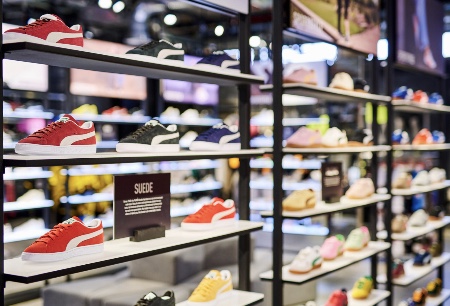BY COLLEEN KERN
The fashion industry, celebrated for its creativity, carries a heavy burden of responsibility for its impact on both people and the planet. Fashion accounts for up to 10% of global carbon emissions – surpassing the combined output of all international flights and maritime shipping. It’s a thirsty industry, too, with a single cotton shirt guzzling the same amount of water that one person drinks in 2.5 years. Our throwaway culture exacerbates these issues, sending 92 million tons of clothing to landfills annually.
Beyond the environmental toll, the social costs are equally alarming, from poverty wages to unsafe working conditions in garment factories worldwide. To address these challenges, Remake, a non-profit organization, strives to transform fashion into a force for good. Their annual Fashion Accountability Report offers a holistic evaluation of companies’ progress towards social and environmental responsibility.
THE 2024 REMAKE FASHION ACCOUNTABILITY REPORT
The 2024 Remake Fashion Accountability Report has evolved to provide a more comprehensive assessment of the fashion industry. This year’s report has expanded its coverage to 52 companies with annual revenues over $100 million and includes several
new additions. The methodology has been refined, with tightened criteria and a focus on demonstrable progress rather than hollow promises.
With a possible total score of 150 points across six categories (Traceability, Wages and Wellbeing, Commercial Practices, Raw Materials, Environmental Justice, and Governance), the average company score was a mere 14 points – unchanged from the previous year despite mounting pressure for reform.
COMPANY PERFORMANCES
Leading the pack, Everlane claims the highest score with 40 points, followed closely by H&M Group at 37 and PUMA at 36. Rounding out the top five are Reformation (34 points) and Ralph Lauren (30 points). Everlane, often touted for its commitment to “radical transparency,” seems to be putting its money where its mouth is. The company demonstrates progress across all categories, with particular strength in traceability and environmental justice initiatives. They’ve made significant strides in adopting more sustainable materials and have committed to sourcing the majority of their natural materials from regenerative or beneficial sources by 2025.
H&M Group’s second-place ranking might raise eyebrows given past controversies, but the report acknowledges the company’s efforts, particularly in emissions reduction and chemical management. The company has also begun investing in suppliers to guide the co-creation of strategies to reduce emissions, a crucial step towards meaningful climate action in the fashion industry.
At the other end of the spectrum, Fashion Nova, Forever 21, JCPenney, Missguided, SKIMS, and Temu all received zero points across all categories, indicating a complete lack of transparency or demonstrable progress on sustainability issues. Perhaps most alarming is the presence of some ostensibly “sustainable” brands near the bottom of the rankings. Rothy’s, known for its recycled plastic shoes, scored only 5 points. This low score highlights the gap between marketing claims and actual verifiable progress in sustainability practices.
Savage X Fenty, Rihanna’s lingerie brand that has garnered praise for its inclusivity, managed just 4 points – and those solely in the governance category.
This underscores the importance of looking beyond a single aspect of sustainability and
considering a brand’s overall impact.
Key Findings Overview
We’ve organized the report findings into three main categories:
- Social Impact: Only 2 out of 52 companies disclosed the percentage of garment workers receiving living wages, while 17% revealed unionization rates in their factories.
- Climate/Sustainability Impacts: 71% of companies now disclose their total annual carbon emissions, but only 8% have set long-term Net Zero targets approved by the Science Based Targets initiative.
- Commercial Practices and Governance: Not a single company has implemented a Buyer Code of Conduct to hold themselves accountable for fair purchasing practices.

DETAILED CATEGORY BREAKDOWNS
Social Impact: The Human Cost of Fashion The report paints a concerning picture of the fashion industry’s approach to worker well-being. Only one company, Puma, stated it paid living wages to all direct employees globally. Few companies demonstrate tangible efforts to support unionization or provide adequate grievance mechanisms for workers.
The gap between rhetoric and reality underscores the urgent need for fashion brands to prioritize and substantiate their commitment to worker rights and well-being.
Climate and Sustainability Impacts: Progress and Paradoxes
While awareness of climate impact is growing, concrete, science-based action remains rare. Water usage, a critical environmental
factor in fashion production, remains largely opaque, with only three companies disclosing their full water footprint. However, there’s a silver lining in chemical management, with 58% of companies adopting a Manufacturing Restricted Substances List to reduce hazardous chemicals.
The much-touted concept of circularity in fashion shows promise but falls short of transformative change. While initiatives like resale and recycling are growing, they have yet to significantly displace linear production models.
Commercial Practices and Governance: The Need for Accountability
Only 4% of companies included responsible sourcing timeline considerations in their order planning, revealing a widespread neglect of ethical considerations in core business operations. While 62% of companies publish full Tier 1 supplier lists, transparency decreases significantly further down the supply chain.
The report also highlights a concerning lack of progress in diversity, equity, and inclusion efforts. Most companies fail to provide comprehensive data on the hiring and promotions of underrepresented groups.
THE ROAD AHEAD
It’s important to note that Remake’s report isn’t intended to be a shopping guide; it’s a call for fundamental industry transformation. The organization emphasizes several key areas for change:
• Legally binding agreements to ensure accountability throughout supply chains.
• Tailored decarbonization investments for each production region.
• A shift from overproduction to true circular economy practices.
• Prioritizing a just transition that centers worker voices.
Despite the challenges, some positive trends emerge. Companies like Burberry, Cotopaxi, and H&M Group are expanding repair services, while Everlane and Reformation show progress in adopting more sustainable materials. In governance, five companies – Inditex, Kering, Nike, PUMA, and Ralph Lauren – have begun tying executive bonuses to social and environmental metrics.
CALL TO ACTION – HOW TO HELP
Remake’s message extends beyond industry insiders to consumers: “Continue to learn, share and act! Use your voice to push companies to do better! Participate in campaigns and vote for policies that protect worker communities, human rights and the environment. Consider each purchase a long term investment.”
But how can consumers put this call to action into practice? Remake offers several avenues for engagement:
- Join Remake’s campaigns: Visit their Campaigns Page to support initiatives like the FABRIC Act, which aims to improve working conditions in the U.S. garment industry.
- Become a Remake Ambassador: Take the lead in the #WearYourValuesMovement by educating your community about sustainable fashion practices.
- Support policy changes: Urge your representatives to support legislation that holds fashion companies accountable for their environmental and social impacts.
- Use social media responsibly: Follow @remakeourworld on Instagram and TikTok to stay informed and share important information about sustainable fashion with your network.
- Support Remake’s work: Consider donating to fund their research, advocacy, and educational initiatives.

As we navigate the complex landscape of fashion and sustainability, reports like Remake’s serve as crucial guideposts. They remind us that transforming the fashion industry demands more than conscious shopping – it requires engaged citizenship, policy advocacy, and a willingness to reimagine the entire fashion ecosystem. While the journey ahead is long, organizations like Remake are lighting the way toward a more sustainable and ethical future for fashion. By taking action, every one of us can play a part in this vital transformation.
Find the full report at www.remake.world/ accountability-report-2024.





